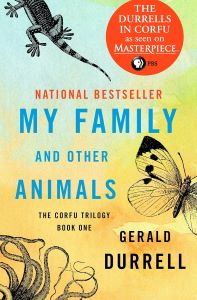How I became captivated by the Durrells.

A few months ago, my son took me to Second Story Books, a large warehouse with thousands of old books tucked into an especially unglamorous part of Rockville, Maryland, between auto body shops and storage facilities — the last place you’d expect to find a treasure trove of products to stimulate the brain and the imagination. It was so overwhelming that I decided to return later with a game plan.
Next time, I arrived armed with the names of books I wanted and (ignoring everything else) went straight for the fiction section at the back, where a pretty tall ladder is needed to claim titles from the top shelves. Among the books I picked up were Lawrence Durrell’s Alexandria Quartet — included in the Modern Library’s list of 100 Best Novels, books I’ve been meaning to read for a long time.
Back home, the paperbacks, with their old-fashioned covers and yellowing pages, stared at me from my coffee table, losing the battle to win my attention, which was more easily drawn to stories by contemporary authors. Finally, after a couple of weeks, I cracked open Justine, the first volume of Durrell’s quartet, and began to read.
It wasn’t easy going. The narrator, an Irishman, recalls his time in Egypt in non-chronological order, moving from one memory to the other. The writing is beautiful but requires a remarkable amount of concentration. Here’s a description of Alexandria:
“Notes for landscape-tones…Long sequences of tempera. Light filtered through the essence of lemons. An air full of brick-dust — sweet-smelling brick dust and the odour of hot pavements slaked with water. Light damp clouds, earth-bound yet seldom bringing rain. Upon this squirt dust-red, dust-green, chalk-mauve and watered crimson-lake. In summer the sea-damp lightly varnished the air. Everything lay under a coat of gum.”
As I read Justine, I remembered that Durrell’s youngest brother, Gerald, was one of my mother’s favorite authors. Books such as Birds, Beasts, and Relatives, A Zoo in My Luggage, Encounters with Animals, and Rosy Is My Relative dotted our bookshelves. Somehow, as a younger person, I was never drawn to these titles. I assumed they were about a man going to exotic places and then dutifully writing about his observations of the fauna.
While struggling with Justine, I became more and more curious about his sibling’s nonfiction, so I checked out the audio version of the first volume of Gerald Durrell’s Corfu trilogy, My Family and Other Animals. My prior assumptions couldn’t have been more misguided. The book was a delight. Most pleasantly surprising to me was meeting the author of Justine as a character here. At 23, Larry, the eldest sibling, is a cantankerous young man devoted to literature and to getting his way.
The book begins with a description of the Durrell family suffering from various ailments due to the English weather, when Larry, annoyed at their myriad afflictions, bullies their mother into selling their house and moving the entire family to the Greek island of Corfu, fleeing “from the gloom of the English summer, like a flock of migrating swallows.”
Once there, we meet the first of many animals young Gerry, 10, will have the pleasure of encountering. As they proceed toward their hotel in a horse-drawn cab, a dozen dogs become enraged by the barks of their own, Roger, and begin a chase. Upon reaching their destination, Larry, who will one day become one of the world’s greatest authors, grabs the driver’s whip.
“Larry had by now forgotten his majestic pose and was rather enjoying himself. He leaped down and danced about the pavement with the whip, cleaving a path through the dogs” along which the family hurried into the hotel.
Soon, the Durrells move into a villa, and Gerry begins to encounter (and often brings home) creatures of all sorts — from scorpions to magpies. Each of these is described with loving humor. Here’s Achilles, a tortoise:
“If you were sitting in a chair, he contented himself with getting as close to your feet as possible, and there he would sink into a deep and peaceful sleep, his head drooping out of his shell, his nose resting on the ground. If, however, you were lying on a rug, sunbathing, Achilles would be convinced that you were lying on the ground simply in order to provide him amusement. He would surge down the path and onto the rug with an expression of bemused good humor on his face. He would pause, survey you thoughtfully, and then choose a portion of your anatomy on which to practice mountaineering. Suddenly to have the sharp claws of a determined tortoise embedded in your thighs as he tries to lever himself up onto your stomach is not conducive to relaxation.”
We also meet numerous unforgettable human characters. There’s Spiro Hakiaopulos, a cab driver who adopts the family as much as they adopt him, who delights in bullying his fellow citizens when necessary in order to make life smoother for the Durrells. Then there’s Theodore Stephanides, a freshwater biologist who becomes a mentor to the young Gerry. And not least of all, there’s the family itself, each of its members with his or her own set of eccentricities.
Leslie, who’s 19, is fond of guns and hunting but also builds Gerry a marvelous boat. Margot, 18, is determined to cure her acne with potions and likes to sunbathe in what’s considered immodest attire. Larry, who domineers in the most ridiculous of ways, also suffers from time to time (for instance, when Gerry’s magpies pillage his room and destroy the manuscript he’s working on). Their mother is possibly the most patient woman known to mankind. She accepts her children’s life choices and actions — however strange or difficult — with good humor.
This book was a balm for the soul. No wonder my mother loved Gerald Durrell. I plan to read many more of his books.
And after getting to know this family so closely, my aspiration to read works by Larry — I mean Lawrence — Durrell has resurged. I plan to once again crack open Justine and the rest of the Alexandria Quartet, the story of a sensual love affair set in a bygone era in a city where Europeans and Egyptians forged friendships and relationships.
I owe it to the Durrells.
Ananya Bhattacharyya is a Washington-based editor and writer. Her work has been published in the New York Times, Guardian, Lit Hub, Baltimore Sun, Al Jazeera America, Reuters, Vice, Washingtonian, and other publications.

